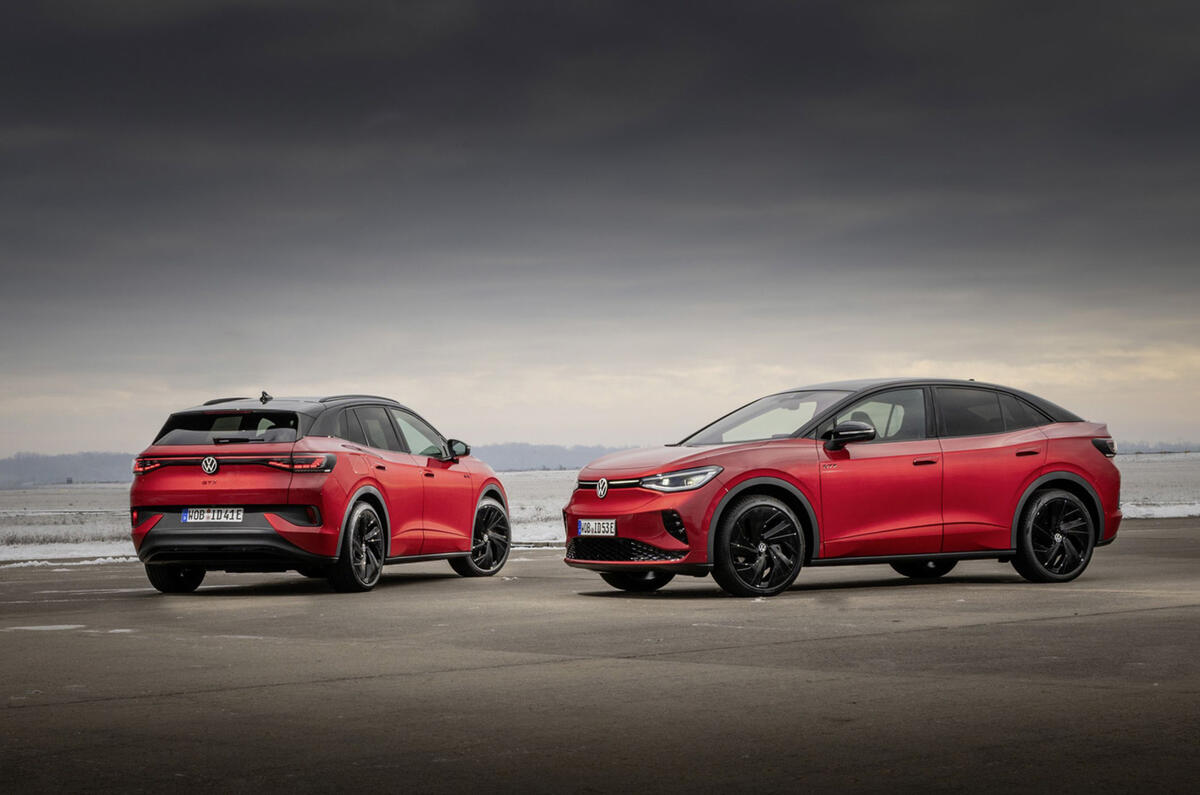The Volkswagen ID 4 and ID 5 are now eligible for the Electric Car Grant (ECG), with a discount of £1500 applied to certain variants.
The grant is available on Pure Essential, Pure Match and Pro Essential versions of the electric SUVs and prices now start from £35,495 for the entry-level variant.
The eligible models are available with a choice of a 168bhp single-motor powertrain or a 282bhp twin-motor arrangement, depending on trim, and either a 52kWh battery giving 221 miles of range or a 77kWh unit offering up to 339 miles.
Volkswagen now has three electric cars eligible for the ECG, which applies to EVs priced at less than £37,000. Its ID 3 hatchback was added to the scheme in the summer and is now priced from less than £30,000.
Eligibility is determined using a set of technical and sustainability criteria outlined by the UK government, which largely hinge around the environmental credentials of the car's main components – taking into account the impact of sourcing, production and shipping.
There are two levels of grant offered and 38 EVs have so far been confirmed as eligible, but of those, so far the Ford Puma Gen-E and Ford E-Tourneo Courier are the only cars to have been awarded the higher, £3750 discount.
The addition of two new big-selling electric cars to the scheme (the ID 4 was the UK's 10th most popular last year) comes shortly after the government's appointment of a new decarbonisation minister with a remit to drive electric vehicle uptake.
Selby MP Keir Mather – at 27, the youngest cabinet minister in 200 years – has been named under-secretary of state at the Department for Transport, with responsibility for EVs and decarbonisation, effectively taking over from Lilian Greenwood, who has moved into a new position at the DfT.
In this capacity, Mather will be closely involved with any development of the ECG scheme and the UK's zero-emission vehicle (ZEV) mandate, and has told Autocar the government is committed to continuing recent growth in the EV market.
"We want your next car to be electric," he said. "Over a million electric cars are already on our roads and that number’s rising fast following action from this government."
He cited September's record EV sales – more than 70,000 were sold last month – as proof of the ECG's effectiveness, with the government claiming more than 20,000 of those sales were ECG-subsidised.
Mather added: "With 38 models to choose from, more drivers than ever are making the switch, saving money and cutting running costs whilst supporting British jobs and boosting the economy.
"Combined with record-setting action on charge points – which have hit over 83,000 across the country and 100,000 more on the way – it’s never been easier or smarter to go electric."








Join the debate
Add your comment
Better of using the money for UBER cabs if 20 MPH is the new way forward. Middle of the night, nowhere near any sensitive buildings, driving around at 20 MPH.
Funny how EV sales go up when there's a Government subsidy, the cost of charging are only going to go up because with the gradual demise of ICE cars and their subsequent Tax loss to the Government this Tax has to replaced from EV vehicles,I dare say as the years go buy we'll end up paying like we did for ICE.
"We want your next car to be electric" speaks to the interfering mentality of the government. No, my next car will be whatever suits my needs the best, whether that's petrol, diesel, hybrid or electric. You don't decide, I do. Also why am I subsidising the car purchases of others? They can jolly well pay for it themselves.
> "Combined with record-setting action on charge points – which have hit over 83,000 across the country and 100,000 more on the way – it’s never been easier or smarter to go electric."
But it's also never been more expensive. Those charge points are so expensive that it's cheaper and more practical to drive a V8 SUV than it is to recharge at a public charger. It's also insane that the government charges 20% VAT on the electricity from those charge points.
Charged at Tesla last night for 40p per kw/h (not a Tesla owner). You can charge at Ionity with a cheap monthly membership for 45p per kw/h. Combine that with home charging and the idea that you can run a V8 for less is fanciful, even before you factor in the higher maintenance costs.
What he said.
Last time I had a look at a few public chargers, it was 74-79p/kWh, going up to 89p/kWh. Assuming about 3.5 miles per kWh, that's about 21-25p per mile. With a V8 car doing about 20-25mpg and petrol at £1.30/L, that comes out to about 23-29p per mile, so pretty close to each other. Needless to say, a regular car is way cheaper to run, with even my big diesel coming in at 13p/mile, which compares very favourably with the 45p/kWh rate you're finding.
It's only if you can charge almost all the time at home where electric cars become really cheap to operate.